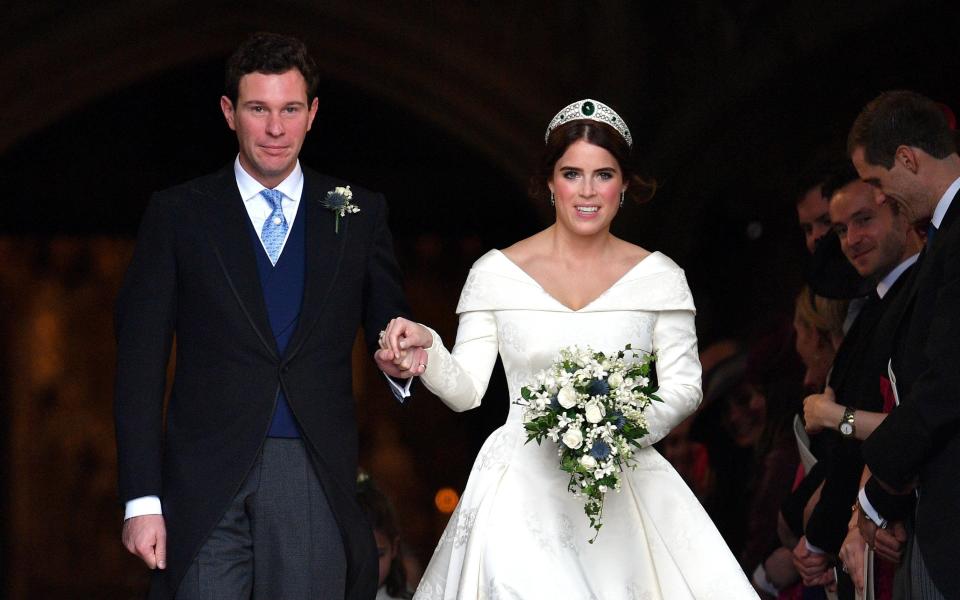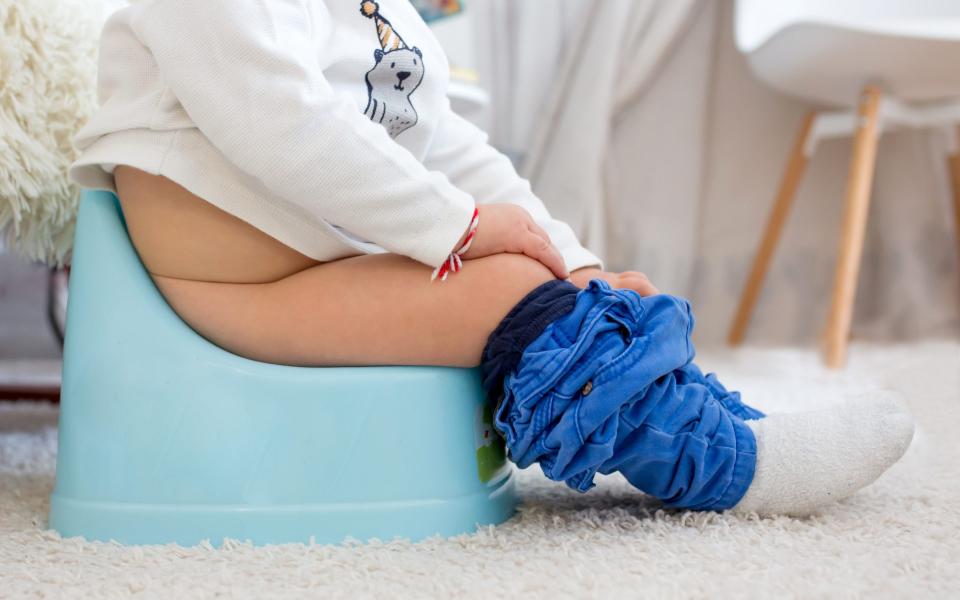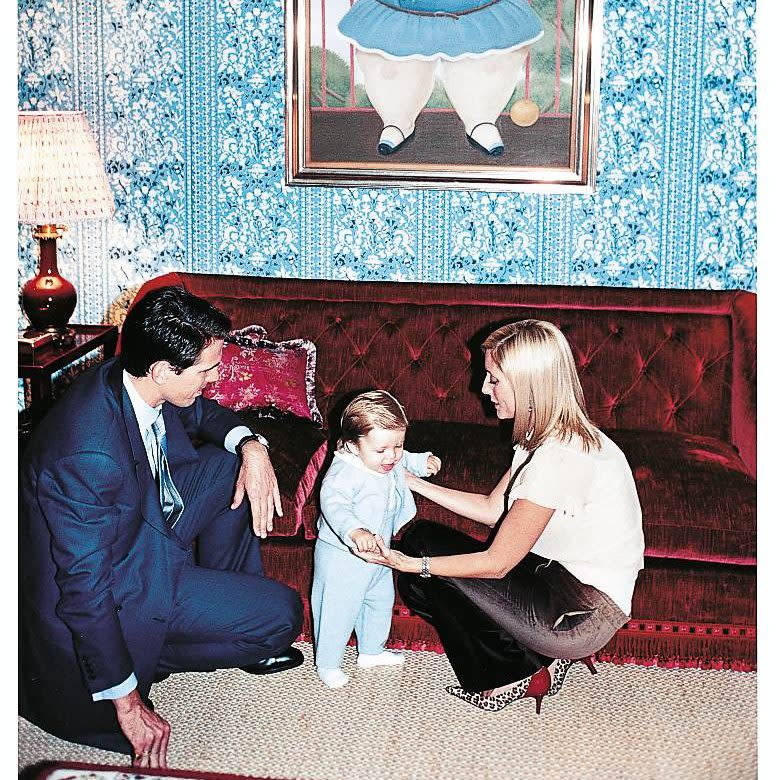As Princess Eugenie gives birth to a boy, this is how the super-rich have babies

On February 9, Buckingham Palace confirmed that Princess Eugenie gave birth to her first child with husband Jack Brooksbank. The new baby boy is the Queen's ninth great-grandchild. But royals and the super-rich don't have babies like the rest of us. No, they have a network of doulas and private hospital wings and top potty trainers to help make life as new parents a little more graceful. This is how the super rich have babies.
Needle matches
Twinkly-eyed Gerad Kite has a reputation for making women pregnant. So much so that the London-based esteemed practitioner of Worsley Five Element acupuncture (a method that focuses on balancing energy flows in the body) has a waiting list and charges £350 for an initial consultation (then £225 thereafter). Kite’s results are legion.
Everyone from Fearne Cotton to Mel C swears by his methods, and his book The Art of Baby-Making: The Holistic Approach to Fertility focuses on a general health reboot to boost fertility rather than fertility treatments.
Kite says he wants couples "to realise it’s a normal function to conceive and make a baby – no different to digesting food. Lots of people have problems with digestion, but they don’t freak out about it. They simply make changes to their lifestyle."
The only obstetrician to call
Forget the Portland and the Lindo Wing, the truly discreet elite plump for consultant obstetrician Nick Wales at Chelsea and Westminster Hospital’s private Kensington Wing.
Straightforward, warm and popular with both fathers- and mothers-to-be, Wales’s client list boasts celebrities, models and the super-rich, some of whom fly in from overseas to give birth in the unit. A consultant-led elective caesarean costs from £10,000, and they also offer evening ante-natal classes.
"Not only are the rooms incredibly private and comfortable here – partners can stay overnight – and the food is good," Wales says, "but unlike some other private maternity hospitals, The Kensington Wing is literally next door to the hospital’s amazing newborn intensive care unit (NICU) and down the hall from operating theatres. People choose us because, if any unexpected problems should arise, they’re in the best place."
Doula to the duchess?
When rumours surfaced that the Duchess of Sussex had looked into homebirth, there was speculation she’d enlisted doula Lauren Mishcon (her husband is Oliver Mishcon, grandson of solicitor Lord Mishcon, whose law firm handled the divorce of Princess Diana and Prince Charles) to help her and Harry through the process.
Not so, says the north London-based mum of three, who has been a trained doula for 11 years… but it’s thrust her ‘From tummy to mummy’ services into the mainstream nonetheless.
While once seen as a hippyish preserve, doulas – self-employed non-medical professionals – have become fashionable in the past decade and some can now command up to £2,000 to ‘emotionally and practically’ support a couple through pregnancy, birth and postnatally, whether the birth happens at home or in hospital. Doulas offer positive mantras, affirmations and employ relaxation techniques to help women through labour.

Popping placenta pills
Having your placenta freeze-dried and made into capsules may not be the most lunch-friendly subject, but it made the headlines when Kim and Kourtney Kardashian joined the celebrity clamour about the process. They’re not alone. It’s recommended by Gwyneth Paltrow’s Goop website, as well as January Jones, Katherine Heigl, Alicia Silverstone and Padma Lakshmi.
Advocates claim placenta is rich in iron and other nutrients and helps mothers recover after birth. Placenta Practice is the UK’s first Environmental Health Office-approved business offering a ‘placenta collection kit’ for £50, which keeps the placenta cool for up to 12 hours.
Getting the placenta into the fridge asap is recommended before the company comes to collect it and turn it into capsules, and indeed skin balms and a tincture to be added to smoothies (from £200).
Pull the emergency cord
Want to really future-proof your child’s health? Smart Cells, a licensed private biobank service founded in 2000, aims to do just this by storing the blood and stem cells from babies’ umbilical cords to be used to create potentially life-saving treatment – should it be needed in future.
Cord blood cells have been shown to be capable of developing into a range of cell types such as nerve, bone, skin, heart and liver cells, and there is hope they could be used to rebuild blood and immune systems.
Some of the other tissue inside the cord holds stem cells that have been shown to be able to repair damaged tissues and reduce inflammation – offering hope for conditions such as Parkinson’s, diabetes and some types of cancer, as well as other illnesses and strokes. Smart Cells works in conjunction with many private maternity units nationwide. (£2,150, plus £100 a year storage fees.)
The potty whisperer
She teaches the children of everyone from Russian billionaires to celebrities and even mere mortals to use the potty and charges £500 a day for the privilege. But with a 100 per cent success rate, it’s a price many stressed-out British parents are willing to pay toilet-training expert Amanda Jenner.
With a strict routine in place and her own range of merchandise and books, Jenner says her consistent and simple regime gives children the tools to use the loo on their own, in double-quick time.

Doing the milk round
The hoo-haa around breastfeeding goes on and on, but if you’re having trouble with it and have the cash, help is at hand. Lactation coaches are all the rage among those struggling with breastfeeding, and London Lactation Consultants are who wealthy west Londoners turn to in their times of need.
A team of seven certified breastfeeding experts are available at your beck and call in your own home, on the phone or via Skype whenever you need them to advise on everything from latching on to using a breast pump (the silent, wearable Elvie, from £249, which fits in a nursing bra and connects to a phone app, is the pump of choice among the elite). Initial visits cost £150.
Sleep magicians
Infant Sleep Consultants are a group of renowned sleep therapists who work with babies and children from the ages of six months to six years, advising parents on everything from when to let your baby nap to eliminating bad bedtime habits and putting a routine into place.
Packages range from advice over the phone to a 24-hour consultation, in which a consultant is with a family all day and night to observe and offer help before prescribing a personalised sleep plan. They work across most of south-east England. A 24-hour consultation is £680.
In the club
Offering everything from baby behavioural coaching to weaning support, baby massage, baby raves, cranial osteopathy, babysitting and crèche, and a ‘from birth’ interactive play zone, Cloud Twelve member’s club in London’s Notting Hill is designed with families in mind.
Privacy is the name of the game here – after all, the rich and famous don’t want to get papped while bending over at the baby gym. Package prices vary, but it’s £10,000 a year for one parent and a child to use the facilities whenever they want. Sibling passes can be purchased for £40 per day.
Spoon feeding
"With an average shelf life of two years, why would you feed your baby food you wouldn’t be happy eating yourself?" asks Jade Ireland, founder of Bellota baby food. Ireland says her products are different. Made using nutritionally balanced, organic, simple ingredients (that have not been heat-treated or pasteurised), all recipes are free from meat, fish, dairy, gluten, refined sugar and salt – and can be delivered nationwide.
Stored in glass bottles and jars, each meal has a shelf life of just four to five days and needs to be stored in the fridge. Ireland, who is a favourite of London’s ladies who lunch, adds: "The heating process used to extend shelf life often destroys many of a food’s nutrients." A one-pot-per-day subscription plan costs from £21 per week.
Couture nappies
Using terry towelling nappies has come back into fashion thanks to its eco-friendly credentials, and it has a new 21st-century moniker to match – ‘cloth bumming’.
Brands such as UK-based Totsbots (£17.99 per nappy) and Stateside company Bumgenius ($24.99) release limited-edition ‘collectible’ patterns that are snapped up in double-quick time and sold online often for hundreds of pounds.
Fans have been known to amass hundreds-strong collections of reusable nappies – there are even cloth-bumming ‘influencers’ such as Cecilia Leslie, who has 25,000 Instagram followers and counting.
A post shared by Cecilia mum of 4 (@cecilia.leslie07) on Apr 8, 2019 at 11:28am PDT
Paint of princes
There’s only one way to paint your child’s nursery in 2020, and it’s with vegan, organic, non-toxic paint (yep, not all paint is vegan; many use milk or beeswax as a binder). At the renovated Frogmore Cottage, Meghan reportedly went for a gender-neutral scheme with paint sourced from the Organic & Natural Paint Co, which has a range for nurseries.
"We all want the best start for our loved ones," says the brand, "and making the switch from your standard toxin-overload petrochemical high- street paints is a very wise decision." 2.5l pots cost from £37.99.

Sweet FA
"We have more requests for family assistants than nannies," says Stephanie Middleton, owner of TGNC, a nanny and au pair recruitment agency in London. A former nanny and maternity nurse, Middleton founded the company in 2011 and her list of clients includes actors, celebrities and television presenters.
"Family assistants act as personal assistants to the whole family," she says. "They order schoolbooks or uniforms, sort out flights for the family holiday, wait in for deliveries, all on top of looking after the children. While they are not a full-time housekeeper, family assistants also help clean and tidy the house and make the children meals if necessary."
Family assistants are paid less than nannies (at TGNC it’s around minimum wage) but some agencies stipulate that the assistant must live in the family home. FAs are only suitable for children above the age of two. "Many of our clients team this with a nanny to look after younger children," says Middleton.
Would you pay a toilet -training expert to prime your little one for their potty? What about a private members club designed with families in mind? We want to hear from you in the comments section below and in the Telegraph Family Facebook Group.
Sign up for the Telegraph Luxury newsletter for your weekly dose of exquisite taste and expert opinion.

 Yahoo Finance
Yahoo Finance 